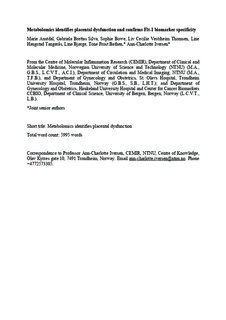Metabolomics identifies placental dysfunction and confirms Flt-1 (FMS-like tyrosine kinase receptor 1) biomarker specificity
Austdal, Marie; Silva, Gabriela; Bowe, Sophie; Thomsen, Liv Cecilie Vestrheim; Tangerås, Line Haugstad; Bjørge, Line; Bathen, Tone Frost; Iversen, Ann-Charlotte
Journal article, Peer reviewed
Accepted version

Åpne
Permanent lenke
http://hdl.handle.net/11250/2645377Utgivelsesdato
2019Metadata
Vis full innførselSamlinger
Sammendrag
Clinical end-stage parameters define the pregnancy disorders preeclampsia and fetal growth restriction while classification of the underlying placental dysfunction is missing and urgently needed. Flt-1 (FMS-like tyrosine kinase receptor 1) is the most promising placenta-derived predictive biomarker for preeclampsia. We aimed to classify placental dysfunction in preeclampsia and fetal growth restriction at delivery by metabolic profiling and authenticate the biomarker Flt-1 for placental dysfunction. We studied 143 pregnancies with or without preeclampsia and/or fetal growth restriction delivered by cesarean section. Metabolic placenta profiles were created by high-resolution magic angle spinning nuclear magnetic resonance spectroscopy and the resulting placental phenotypes obtained by hierarchical clustering. Placental Flt-1 expression (membrane-bound and soluble isoforms combined) and maternal serum Flt-1 expression (soluble isoforms) were analyzed by immunohistochemistry and ELISA, respectively. We identified 3 distinct placenta groups by 21 metabolites and diagnostic outcome parameters; normal placentas, moderate placental dysfunction, and severe placental dysfunction. Increased placental Flt-1 was associated with severe placental dysfunction, and increased serum Flt-1 was associated with moderate and severe placental dysfunction. The preeclamptic pregnancies with and without placental dysfunction could be distinguished by 5 metabolites and placental Flt-1. Placental Flt-1 alone could separate normal pregnancies with and without placental dysfunction. In conclusion, metabolomics could classify placental dysfunction and provide information not identified by traditional diagnostics and metabolites with biomarker potential were identified. Flt-1 was confirmed as precision biomarker for placental dysfunction, substantiating its usefulness for identification of high-risk pregnancies for preeclampsia and fetal growth restriction with placental involvement.